Mr Narendra Luther obtained his MA in Political Science in 1953, joined IAS in 1955 and retired as Chief Secretary, Andhra Pradesh, in 1991. He now lives in Hyderabad. E-mail: narendraluther@gmail.com; Website: www.narendraluther.in
–
I was born in Hoshiarpur on 23 March 1932. My father was a lecturer in the Government Junior College there. Soon after my birth he was transferred to Shimla. My earliest memories begin with the sanitized town of Shimla where we spent the first seven years of my life. After Shimla we lived mostly in Lahore in a suburb called Dharam Pura. All of us were given elementary tuition in classical Indian music. It was decided that I was not good enough vocal music, and so was pushed on to tabla. Those days it was treated merely as an accompanying instrument. I had therefore to depend upon one of my siblings to enable me to show off my proficiency. I did my schooling in DAV and Government High Schools in Lahore viagra en tunisie. I was a topper.
***
At the time of Independence, we were in Rawalpindi and were stuck there till 18 October 1947. For the last month of our stay there, a kind Muslim colleague of my father, gave us refuge in the cantonment in his son’s house which he vacated for our sake. Escaping repeated attacks, our heavily guarded train reached Amritsar on 21st October 1947. Any picture of a typical refugee train would show how we travelled. Nine dead bodies were recovered from our train. We sat down for a langar on the left of the platform, while the dead bodies were being cremated a few yards away on the left.
I did my intermediate from DAV College Jalandhar, where the two- year course was compressed into about 18 months. In Garh Shankar, where my father was posted, a member from each refugee family was allowed to pick up the needed household items from an evacuee property. While doing so I also picked up a copy of the Quran as a gift for my father since his own had been left behind in Pakistan. At home, my eldest sister asked agitatedly why I had brought a copy of the book that had brought so much ruin upon us. My father admonished her telling her not to forget that we were given asylum by one of the persons who followed that book. I still have that copy [1].
I joined the co-educational Government College Hoshiarpur for BA in 1949. Sometime around that time it was upgraded to University College. The college had a neat colonial style building with a hall for meetings and a spacious lawn in front. The science labs were on the left of the main building while the Arts classes were held in a rectangular enclosure called ‘Quadrangle’ on the left of the main building. As one entered it, on left extreme was the Staff Room, and on the right the Girls’ Room. At every dong of the college bell, black gowns fluttered in and out from the room on the left, while a splash of colours showed up from the room on the other extreme.While the male students had a hostel in the Model Town of Hoshiarpur, the female students were accommodated in a spacious bungalow quite close to the college. It had an iron gate covered with jute. It had a resident lady warden who kept a close watch on her wards.
I had only one pair of hand-me-down gabardine trousers of my elder brother and a woollen pullover knitted by my grandmother. But I was not conscious of that, nor I think were others.
I also joined NCC as a cadet. Our evening parades were held once or twice a week.
Dr. Vishwa Nath, an anglicized and stern-looking person, was the Principal of the College. He started the Gandhi Prayer Class which was the first and compulsory period every Saturday. He would come earlier and as we entered the College we could hear his recitation of shlokas from the Gita and his explication in English. That tedium was relieved by the singing of bhajans and shabads by a group of selected boys and girls.
Dr Vishwa Nath retired as principal in 1951. However, he would not hand over charge to Dr. Dewett and stayed put in his large room. Poor Dr. Dewett then set up his office in a small room. A notice was put on the board outside proclaiming the change. Dr Dewett and Prof. Verma were our professors in Economics.
Prof. Mehta, a handsome man who taught Political Science in MA, was an honorary captain, and also the warden of the Men’s Hostel. Wadhawa Singh, an honorary lieutenant of NCC, was a butt of numerous jokes because of his poor English. His own son, a student of MA English, who was also editor of the College Magazine, in a humorous column on the staff, wrote about him that he asked a student to meet him ‘behind the fourth and in front of the third period’.
I was a shy student. But when I saw the first debate held in the college, I felt an irresistible urge to participate in it. The opportunity was provided by the annual declamation contest. I enrolled for that and practised my speech for fifteen days. To my surprise I won the first prize beating a veteran debater. That helped me come overcome my shyness and I started participating in college and inter- collegiate and inter- university debates.Thereafter, I started taking active part in extra-mural activities. I was also elected secretary of the Students Union.
I shared top prizes in the annual function of the college, in BA with a class-fellow, Padamja in all subjects. I got an extra prize for being the best debater.
I stood first in the University in my BA (Honours) and won a medal and a scholarship of 25 rupees per month. The vice chancellor awarded me a special scholarship of equal amount. By then I had also started writing for the daily Tribune, then the only English daily in the Punjab and located at Ambala. From my monthly articles I used to get twenty rupees. In a competition, I was selected to represent my college for a debate on All India Radio which had a station at Jalandhar, about 30 kilometers from Hoshiarpur. That started me on my life-long association with All India Radio. I used to get 15 rupees per programmes out of which three or four were spent on bus fare. My father had retired by then and my earnings thus made a crucial contribution to the family income.
In MA, I changed from Economics to Political Science. Dr. Dewett was very unhappy at my leaving Economics and told his class in Economics that Dr. VKRV Rao, the then director of the Delhi School of Economics, had written to him offering a national scholarship of Rs. 200 per month for me for doing MA in Economics. I don’t know why he did not tell me that.
Bodh Raj Sharma was the head of the department of Political Science and he lectured on political theory while Kartar Singh taught applied politics. Prof. Mehta taught British Constitutional History. He used to dictate notes from his old copy book.
I was appointed editor of both the English and Urdu editions of the college magazine. However, Surinder Singh Kairon, elder son of the then chief minister of the state, Partap Singh Kairon, pressurized the principal for his appointment as the editor of the English magazine. Thereupon, Miss A. G. Stock, an Irish lady who was Reader in the English department, conducted an essay – writing competition. I stood first but Surinder Singh was mollified by being appointed Sports Editor. He wanted to interfere in the selection of articles for the magazine which I resisted. Surinder then became my enemy. He used to bring a revolver to the college and had a hit list which I headed. Students resented his attitude and the whole college went on a strike for a day.
Miss Stock had a Byronian limp and a way of gesturing with her right hand while speaking. Many students of hers adopted that gesture. Though she was not my teacher, I learnt a lot of political theory from. She had a good private library and would gladly lend me books to follow up on our discussion.
Prof. D. C. Sharma was the University head of the English department and took post graduate classes. He was a short person and used to wear Kurta and chooridar pajama. He used to take his classes in his room since there were not more than six or seven students. He became a very influential person after he was elected to the Lok Sabha for two or three terms. He was quite free with his students and used to narrate jokes with a poker face.
Professors used to go to pay court to him in his durbar and would submit meekly to his tick offs. He would often greet a supplicating professor derisively with a remark, like: ‘And now he comes’ and then turning to him, would ask, ‘What do you want? Want to become principal, haiN?’ Sharma had a mesmerizing gaze. Once my brother Virendra took me to his small class and challenged me to out-stare him. I tried and Sharma kept on lecturing without turning his piercing gaze away from me. I lost.
In 1951 the faculty was augmented by some new young members; Raj Kumar Kaul from Oxford in the English faculty and the bald–headed, impish, and a genial Gautam Mathur from Cambridge in Economics. Gautam took part in skits and impressed the audience with his ready wit. He died of heart attack at an early age in Delhi, snuffing out a brilliant career. Prof. Handa taught statistics while Prof. Batra was professor of Urdu.
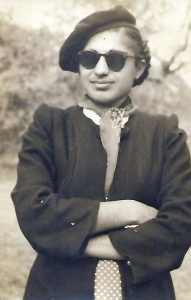
Birinder Khurana at a picnic in 1952
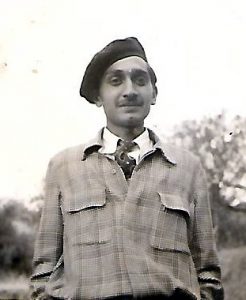
Narendra Luther at a picnic in 1952
Amongst the graduate male classmates, I remember fondly O. P. Malhotra, Harbhajan Singh and Tej Kumar; and amongst girls, Kamla Gulati and Padamja. Kamla went on to do MA in Economics, while Padamja continued in MA political science. Birinder Sekhon, a niece of Partap Singh Kairon, and Bindi (Birinder Khurana) were new entrants amongst female students. In 1952 while doing MA I fell in love with Bindi, a classmate of mine. As a result, I could not continue my earlier trail and got only a second division in my MA in 1953. I felt chastened.
A whole new group of male students entered my class. Amongst them was a ‘ruling’ mahant who came of his own volition to get higher education. He used to wear a turban, a collar shirt and chooridar pajamas. We used to address him as Mahant ji. My best friend was Narinder Singh Kapur. Outside my class prominent names were KSB Sanyal, DPS (Polly) Ahuja and Satinder Bawa in English, Satinder Vir Kesar in Chemistry, Gurbachan Singh and Bagicha Singh Minhas in Economics, and T. N. Puri (probably also in Economics), were all a year senior to me. Sanyal joined Burmah Shell and later entered the public sector to become chairman of Andrew Yule & Co (?) He used to drop in whenever he visited Hyderabad. Polly retired as GM of the Railway at Bangalore. M. M. Puri and Iqbal Nath Chaudhury were my seniors in Political Science. Both were very jovial and used to crack excellent jokes. Iqbal had false front lower tooth which he used to juggle making it disappear and reappear with his tongue like a magician. Puri’s younger brother was the manager of a new restaurant called Bhojan Bhandar where for the first time we heard the names of Idli and Dosa and relished them immensely.
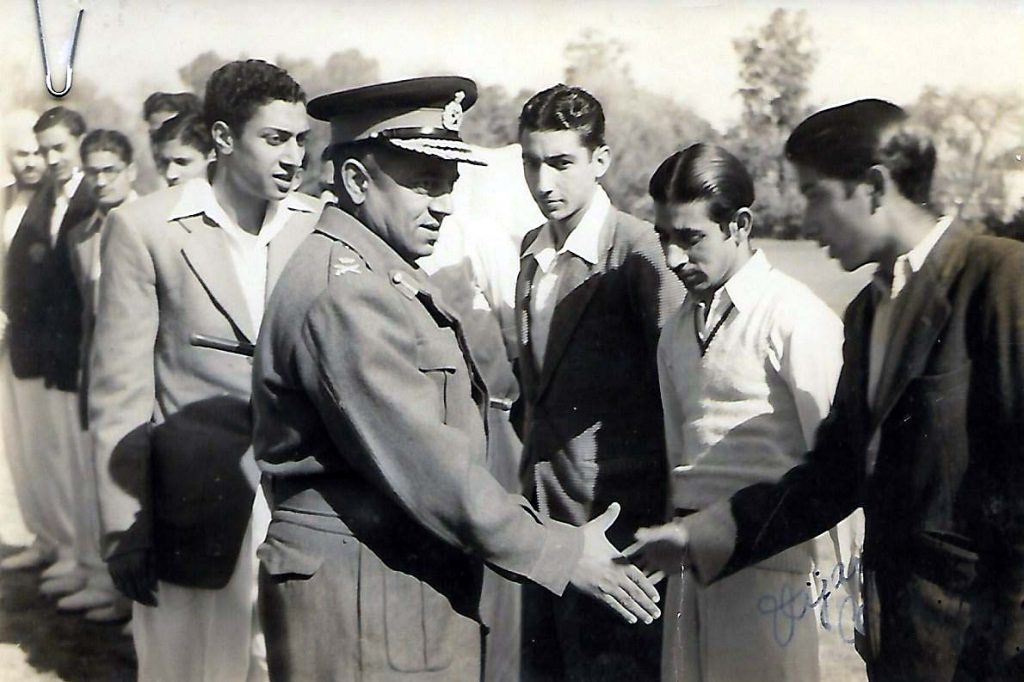
University Cricket Captain VC Katoch introducing his team to GOC Northern Command
Manmohan Singh and Brijinder Goswami were a year junior to me in Economics and in History respectively. V. C. Katoch of Zoology captained the University cricket team and also played for Ranji Trophy. He resigned prematurely from the Indian Detonators & Chemicals Company in Hyderabad. Now we live opposite each other.
A charming young Indian from Africa, Ranjit joined the college in the first year when I was in MA. He was very good in graphology (analysis of handwriting), numerology and palmistry. We became very good friends and I pursued these subjects for some time and became quite proficient in them. Narinder Kapur’s father was superintendent of jail in Ambala. He permitted me to read a condemned prisoner’s palm. I predicted that the prisoner had a long life ahead of him. It turned out later that his sentence was commuted to life in prison.
Narinder Kapur, Brijinder Goswami and I were the closest friends and used to meet practically every day. We started an elite club named TKT (Tea Kup Talk ). It used to meet once a month. It survived for a few years after we had left the college.
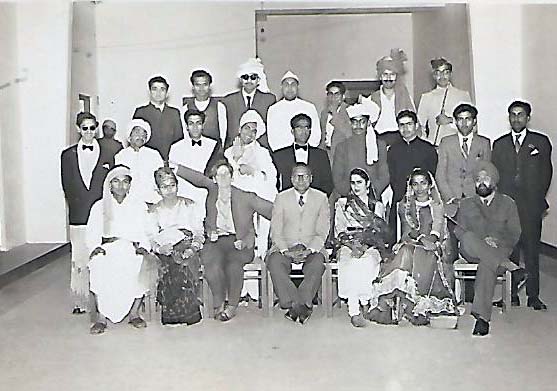
TKT Club annual fancy dress party, 1955
A cousin of mine (my mother’s brother’s son), Brij Mohan Sagar, joined the college to do his BA in 1952 or 1953. He was a brilliant student who had read the complete works of Shakespeare before he came to the college. Brij inherited the poetic talent of his father and our common grandfather in full measure. We used to enjoy his excellent Punjabi poetry and his company in Hyderabad where he was posted many years later.
Prof. D.C. Sharma’s two sons (one of them was Krishna K. Sharma) and their cousin were the stars of the Dramatic Club of the college. They staged some fantastic humorous and satirical skits. Women students were not allowed to act in plays. So I played Portia’s role in Shakespeare’s ‘Merchant of Venice’. With his macho bearing and a booming voice, the role of the aggressive Shylock suited T. N. Puri to a T. In another female role one of my stuffed boobs came off and the audience burst into laughter much to the actors’ discomfiture.
Once we decided to celebrate April Fool Day on a big scale. We put out a notice a week or so in advance that the Abyssinian ambassador to India would be addressing a function in the college. T. N. Puri was selected to act as ambassador for the role. We smeared every visible part of his body with black soot to impart him a Negroid identity. He procured a long multi-coloured gown to wear. Satinder Vir Kesar loaned his father’s car and driver and a student drove on his motorcycle acting as pilot for the ambassador’s car. At our request, Dr. Dewett headed the reception committee and made an appropriate welcome speech at the well-attended function. I don’t know whether he knew the game or was genuinely fooled, but he played along. Puri made an impressive speech at the end of which he thanked the audience to let him befool them.
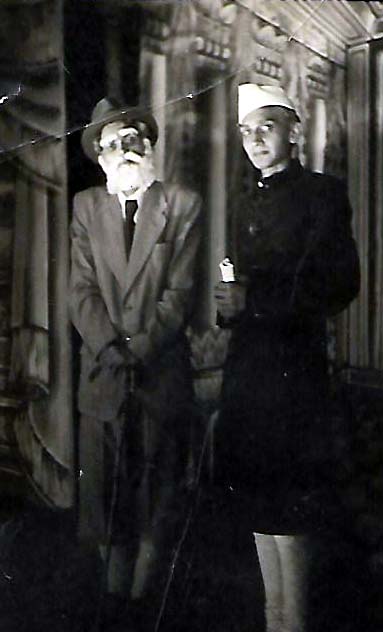
Narendra Luther (right) as Nehru and Kewal Krishan Nayyar as George Bernard Shaw in a play at Hoshiarpur
We also staged a mock United Nations session for which I wrote the script. In one skit I acted as Nehru and Kewal Krishan Nayyar as George Bernard Shaw. Kewal was a very intelligent and sensitive person with pronounced leftist leanings.
The College library was very poor as were other facilities. Books were kept in locked glass almirahs and the librarian had a proprietorial reluctance to get up and open them. However, he was kind to me. In retrospect, I feel that my generation of students missed a proper university education. But then everything was make-shift in the aftermath of the partition. Luckily, there were other rich students who bought books which we could not afford, and they were glad to share with us.
The College was a community and we had little interaction with the town. There were some rich businessmen in town but we were mast in our own little universe.
Some of the adulation I received from the students and pats from the faculty went to my head. I contested elections for the presidency of the Union. Dev Brat who had just finished his MA was brought in to join the fray. He joined the college again for another M. A. and so cut my votes. Both of us lost and thereupon Dev Brat left the college. My experience during the elections for the Students Union was so disgusting that I decided never again to take part in any electoral politics at any level.
***
My younger brother Virendra Luther joined the College in the first year when I was in the fourth year. We were very close buddies and shared all our secrets and our dreams. He was the brightest – and most difficult – of all his siblings. He learnt vocal music and Kathak dancing but gave up the latter when he was taunted for effeminacy. From his childhood he was finicky about his dress which he used to design himself. It continued right up to his death. After doing BA (A Course Physics) he went on to do MA in English.
Because of his natural talent for music Virendra was appointed secretary of the Gandhi Prayer Class and used to orchestrate a weekly programme of songs and shabads by a mixed a group of boys and girls from across various classes.
Later he acquired proficiency in harmonica and became popular for that. Virendra joined the Sharma Brothers in the Dramatic Club of the college and soon became its leading light.
For a role he played in a skit scripted by me, he became well-known as ‘Gullu’ and all students from that period know him only by that nickname. In course of time, he became editor of the college magazine and president of the Students Union. He was awarded the best all-rounder prize. Our photos were published together in the annual number of the magazine in 1954 or 1955.
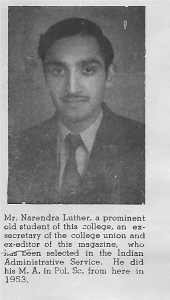 |
‘Gullu’ remained a mast malang all his life. He always defied authority and lived life on his terms.
After his MA in English, he started teaching and enjoyed the adulation of his students. He married my wife Bindi’s younger sister. For that he and my father went to a magistrate’s court in Ambala. The bride-to be, Gago came on her own from Batala. There they found that the prescribed notice period for civil marriage was not yet over. Thereupon they went to the nearest gurudwaras and got married there. After that my father returned by bus to Chandigarh while the new couple drove back on Vijay’s scooter. He was pressurized by Gago to sit for the civil services exam. Just to oblige her, he did so and was selected for the Railways. He served there for two years but found the bureaucratic framework very suffocating for his artistic temperament. On an impulse he resigned the job to go back to teaching. On the way, he came across an ad by a British Company asking for a creative person for a managerial job. He wrote back to them casually asking how come a British company was looking for a creative person!
The company responded with an invitation to him to meet the MD at Kolkata. He was selected by the Gramophone Company of India the monopoly company well -known to Indians as producer of His Master’s Voice gramophone records. He was offered a salary four times that he was getting in the Railways and was posted in Mumbai as Artistes and Repertoire Manager.
His job was to keep in touch with singers and actors and produce new discs. He took the job like fish to water and signed up Lata Mangeshkar, Asha Bhosle, Begum Akhtar, Mohammad Rafi and others for new 33 rpm discs. He also discovered new talents like Meena Kumari to sing her own poems. He used to write blurbs of the sheath for the discs. Simultaneously, he also used to produce a weekly programme of songs for Radio Ceylon. Surprisingly, many persons used to recognize him because of his voice.
He declined a promotion in the Company to stay on the same job. When HMV folded up its operations on India, he was retained by the Indian promoter of the successor company ‘Polydor of India’. For sometimes he represented the federation of all disc producing companies at Delhi. Later he was selected as director of Film Festivals under the ministry of information and broadcasting. He liked that job very much. There he ran afoul both of the secretary and the minister and his contract was not renewed.
From the beginning he was very keen on going to the U. S. He sent his son Pablo to U. S. for doing MBA. He completed his course and also married an American girl. That made it easy for him to leave this ‘wretched’ country. The entire family, except his daughter, migrated to the U. S. and took American citizenship.
He did some jobs for some time. After a spell of ill health, he passed away in 2005.
His mail ordered accessories continued to come after his death. His wife Gago had to return them with regret. Since our body measurement were identical, she packed up a suitcase full from his wardrobe and handed over to me. Eleven years later I am still wearing them. I started with hand-me downs; I will end up with hand-me-ups. Destiny!
Gullu’s wife and their two sons continue to live with their families live in San Jose.
***
B.S. Minhas had a rural background and worked very hard to overcome his handicap in English. He was the first to blaze an international trail in Economics. He became member of the Planning Commission and also of the Finance Commission at a very young age. Later he worked in the World Bank and FAO .
Brijinder Goswami was brilliant . We shared common interest in Urdu and English, both outside our respective subjects – and a good sense of humour. Brijinder wrote a poem in English supporting me in my election campaign. He always scored over me in debates. He won election as president of the Students Union and resigned soon after. He stood first in History in the university and was selected in IAS a year after me and resigned that too. Later, he won international renown in the History of Art.
Kesar, a handsome gentle and quiet person became professor of Chemistry in the Panjab University. He is regarded as the pride of Punjab in that subject. Narinder Kapur joined Khalsa College in Delhi and fought many legal battles against the management on communal issues. We kept in occasional touch on internet till a few years ago. My last mail to him did not elicit a response.
Manmohan Singh was a very studious, shy and reserved student and his trail began after I had left the college. We met again when he joined the government of India as a director in the commerce ministry while I was deputy secretary in the ministry of steel in the same building. Thence his rise was meteoric ending with a decade as prime minister from 2004.
***
While waiting for the result for IAS examination, I taught at a college in Ferozepur for five months. I finally left Hoshiarpur to join for my training in May 1955. Since then I have not been able to visit Hoshiarpur though I have been to Chandigarh a number of times.
***
I married Bindi, my old girl friend from the University days, on the completion of my IAS training at Delhi in 1956.
Bindi came from a landed and industrial family of Bhalwal. Her grandfather, Chanchal Singh and his brother Sujan Singh had made a fortune as contractors for the construction of the Shimla- Kalka railway line. Sujan Singh settled down in Delhi and became India’s first realtor. Chanchal Singh bought lands and set up cotton factories in Bhalwal. His eldest son was Khazan Singh. Bindi was his second eldest daughter. Like us, they just managed to scrape through the partition with their lives and honour intact.
***
I was allotted to Andhra which soon after my arrival became Andhra Pradesh on 1 November 1956. I won early renown in my very first posting for flood relief and rehabilitation work at ‘grave risk’ to my life as the Gazette Extraordinary Citation issued by the government noted.
Thereafter I worked in Hyderabad in a number of jobs. In 1959 I was awarded a British Council scholarship to do a post graduate course at Leeds University. In 1972, while working as director of industries I was deputed to Libya to as advisor for the development of small-scale industries. As head of the Municipal Corporation of Hyderabad, my project for slum improvement was not only funded by Unicef, but also adopted by it as a world-wide model.
I did two routine spells in the government of India, retiring in 1991 as chief secretary of Andhra Pradesh.
I kept my extramural interests alive during my service and beyond. I wrote four books in Urdu largely devoted to humour for which I won seven awards.
I took a conscious decision not to accept any job in government or the private sector after retirement and decided to fulfill my childhood ambition of writing. A synchronicity of mysterious forces turned my dabbling in the history and culture of Hyderabad into serious writing and I ended up writing 12 books on the subject, besides numerous articles and essays. Some of my writings have been translated into Urdu, Hindi, Telugu and Oriya besides other languages. I also produced six documentaries, one of which won two awards at the Japan International Heritage Films Function award in 1999.
I don’t know when I contracted a fatal disease – called old age.
According to a touching saying in the South, I have seen a thousand moons. For those who have accomplished that feat, there is no mourning when they cross over. There is only celebration of their life.
***
[1] Fuller account of our life in pre-Partition Punjab and our travails during and after the Partition is given in my forthcoming autobiography, The Bonsai Tree.

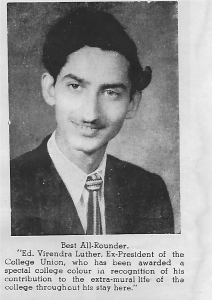
Leave A Comment